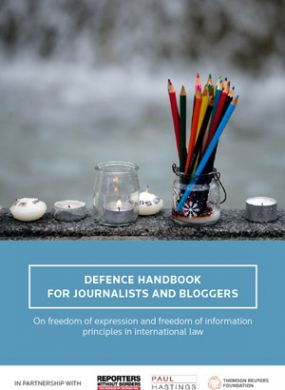Often where groups wage war in the name of religion, 110 journalists were killed in 2015

A total of 110 journalists were killed many of them in connection with their work and some of them for their beliefs or resistance to acts carried out in the name of religion in 2015, says Reporters Without Borders (RSF).
Paris-based RSF said that 67 of them were targeted because of their work or were killed while reporting. Some of the bloggers were killed because of their secularist beliefs.
More than half of the 67 journalists killed perished in Iraq, Syria, France or Yemen where some of the key protagonists in the conflicts are waging them in the name as what they perceive of as religion.
"The creation of a specific mechanism for enforcing international law on the protection of journalists is absolutely essential," RSF secretary-general Christophe Deloire said.
"Non-State groups perpetrate targeted atrocities while too many governments do not comply with their obligations under international law.
CALL FOR SPECIAL UN REPRESNTATIVE
"The 110 journalists killed this year need a response that matches the emergency. A special representative of the United Nations secretary-general for the safety of journalists must be appointed without delay."
These 67 deaths bring to 787 the total number of journalists killed in connection with their work since 2005.
It has not been possible to clearly establish the circumstances or motives of this year's 43 other deaths of journalists. Twenty-seven citizen-journalists and seven media workers were also killed in 2015.
This disturbing situation is largely attributable to deliberate violence against journalists and is indicative of the failure of the initiatives so far taken to protect media personnel.
A European country, France, was one of the deadliest countries for journalists in 2015.
CHARLIE HEBDO ATTACKS
Two heavily-armed masked men, Saïd and Chérif Kouachi, marched into Charlie Hebdo's headquarters in Paris on Jan. 7 and gunned down 12 people, including eight journalists.
They were cartoonists Charb, Cabu, Tignous, Wolinski and Honoré and reporters Elsa Cayat, Mustapha Ourad and Bernard Maris.
Two days later, Al-Qaeda in the Arabian Peninsula (AQAP) said it carried out the attack to "avenge" the Prophet Mohamed, often the subject of Charlie Hebdo's satirical cartoons. Instigated by an extremist ideology that does not tolerate blasphemy, the attack underscored the need to combat the concept of "defamation of religion."
It ranked third, after Syria and Iraq where the group knowns as IS (Islamic State) or Daesh wages a war of terror against Christians and Muslims or anyone who does not follow its system.
Journalists are one of their targets.
The January attack on Charlie Hebdo contributed to a reversal of last year's trend, when two thirds of the deaths of occurred in war zones. This year, two thirds of the deaths were in countries "at peace."
With Syrian President Bashar al-Assad's forces, militant groups, Kurdish groups and coalition air strikes, "the Syrian city of Aleppo is a minefield for professional and citizen-journalists," said RSB.
"Caught between the various parties to the conflict since 2011, journalists are liable to end up as collateral victims, being taken hostage by a non-state group, such as Islamic State, the Al- Nusra Front or the Free Syrian Army, or being arrested by the Assad regime."
INFORMATION BLACK HOLE OF MOSUL
The RSF report cited the Islamic State-controlled city of Mosul in northern Iraq as "information black hole."
In Mosul alone, the Jihadi group has been responsible for 48 abductions and 13 executions of journalists and citizen-journalists in the past 18 months.

Some 60 professional and non-professional journalists and media workers have fled the city, while those that are still there cannot work for fear of reprisals.
"Disinformation reigns in this environment. Contact with the outside world is banned or restricted by IS, which also controls communications and the Internet," said RSF.
MASSACRE OF BANGLADESH BLOGGERS
RSF documented the "shocking massacre" of four bloggers in Bangladesh in 2015.
The victims - Avijit Roy on Feb. 26, Ananta Bijoy Das on March 30, Washiqur Rahman on May 12 and Niloy Chakrabarti on Aug. 7 - were all secularists who advocated tolerance, free speech and freedom of thought in their blogs.
Responsibility for their murders was claimed by Ansar al-Islam (a branch of Al-Qaeda in the Indian Subcontinent) and Ansarullah Bangla Team, another militant group.
"The passivity of the Bangladeshi authorities in the face of this bloodbath has fostered a climate of impunity that is extremely dangerous for citizen- journalists. The perpetrators and instigators of these appalling crimes have yet to be arrested and brought to justice," said the RSF report.